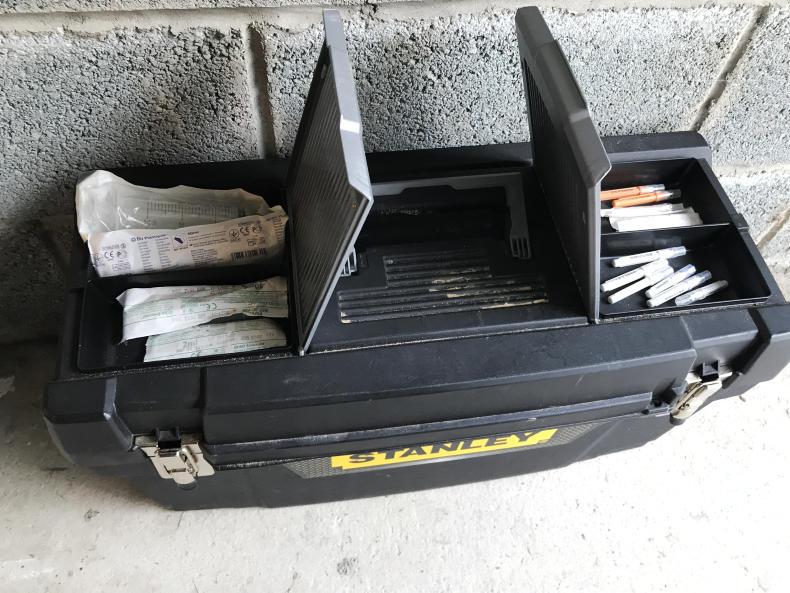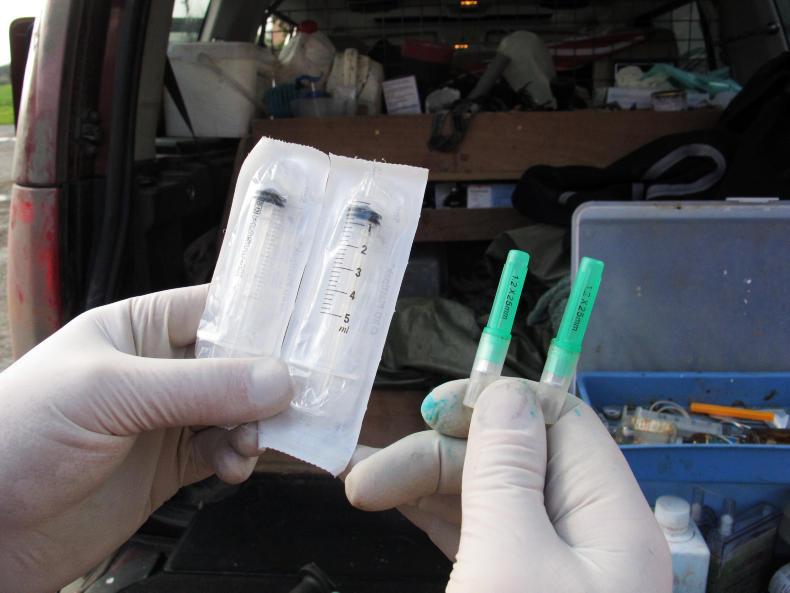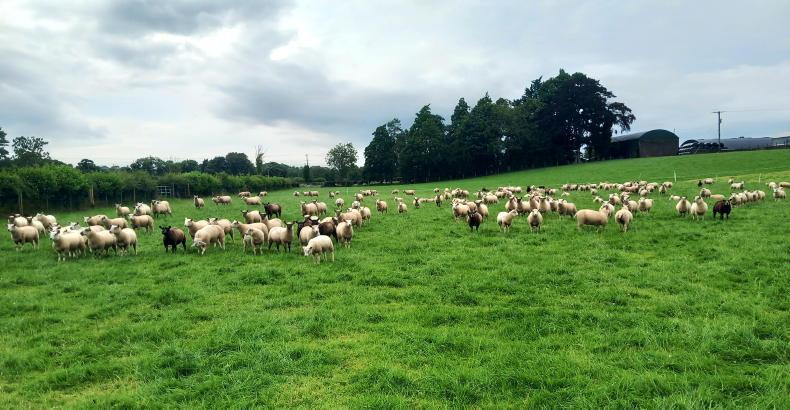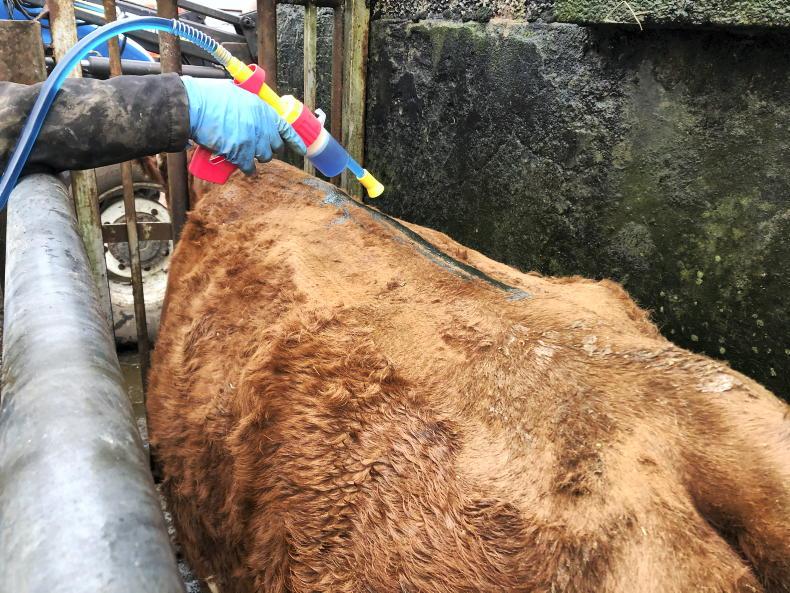Handling medicines carefully is critical. While medicines can be extremely important to the animals we use them on, they can have serious side effects if we accidentally inject ourselves.
Firstly, when storing medicines on-farm, they must be in a secure, locked cabinet out of reach of children.
When handling medicines, give yourself time and have animals properly restrained.

A simple tool box for carrying medicines safely to an out-farm.
Be careful with needles and watch for sudden kicks or movement which can result in needles flying into eyes.
Have the right needle length and size for the animal and injection. Clean needles should be used every time.
Any needle that breaks human skin can cause infection and lead to serious problems
When automatic guns are being used, ensure they are calibrated correctly. Always replace the cap on a needle after use, as this can be where a lot of accidental self-injection occurs.
Keep all data sheets from products used, as they contain very important safety information.
Any needle that breaks human skin can cause infection and lead to serious problems.
This is why good cleaning facilities should be available.
In the case of self-injection, stop what you’re doing and clean the wound with hot soapy water immediately
Have a small toolbox for out-farms to carry and store needles and syringes, along with a smaller disposal pot.
In the case of self-injection, stop what you’re doing and clean the wound with hot soapy water immediately.

Always replace caps on needles after use to avoid self injection.
Then proceed to read the data sheet carefully and follow safety instructions. You must seek medical attention if advised to do so.
The data sheet is so important, as many medicines will have different safety precautions after self-injection.
If in doubt, ring the supplier of the medicine and they can forward you to the specific product manufacturer.
With pour-ons and topical medications, try to avoid splashes getting into your eyes.
Watch self-injection sites for up to seven days and seek medical attention if any swelling, pain or discolouration at the site gets worse.
Carefully bandage all wounds and wear gloves to prevent infections entering any open cuts or sores.
All used medicines must be disposed of in special secure biohazard containers (yellow bucket with purple top).
These must be removed from farm by a registered company for disposal.
Hygiene tips for the winter time
Hygiene on the farm is all part of better disease management, but also health and safety for the farmer. Reducing illness on the farm is better for stock and the stockperson.
Run the scrapers as often as possible in the winter time: Make sure scrapers are working well and that faeces aren’t pooling in areas where cattle will be standing. Reducing the amount of dung that cattle’s feet and cows’ udders are exposed to dramatically reduces the infections pressure (bugs in the environment). Scrape cross-overs and areas where mechanical scrapers don’t get to. Plenty of clean fresh straw: Few things can make more of a difference than a good clean bed of straw. Autumn calves nestled in fresh clean straw have a reduced risk of disease and keep warm in winter. Use lime under straw in housed sheep to reduce the build-up of bugs. Liming cubicles twice a day: Another thing that can make a big difference is cubicle lime. Scraping cubicles is hard work, but should be part of the winter routine. Some farmers mix hydrated lime with fine sawdust 1:2 and this soaks up moisture. Spraying disinfectants on cubicles is also recommended, but farmers should work on scraping and liming twice daily first.Invest in a steam cleaner for your farm: A lot of the bugs we try and tackle in farming can be hard to kill, such as cryptosporidium and coccidiosis. Some bacteria produce a slime (biofilm) which can make them hard to kill. Surfaces may look clean, but the use of a steam cleaner on buckets and especially farm equipment can make a big difference. Cleaning surfaces should be straightforward, particularly calving pens and lambing pens. Smooth surfaces are easier cleaned, but may become slippy (another reason for plenty of straw bedding).Clean out water troughs daily: Few things are as important as water for cattle and sheep indoors. Clean drinking water must not be under estimated. Invest in large tip-over troughs that are positioned at the right height for animals to get their muzzles into themGloves: Have clean, disposable, arm-length gloves when working directly with animals, especially examining sick animals or when birthing. Gloves make your hands easy to clean and protect the skin from harmful bugs, especially at calving and lambing time. Always wear gloves when using medicines and dosing on your farm. Have alcohol hand wash dispensers in the farm office or somewhere you can use regularly to reduce the risk of spread of bugs around your farm and importantly into your household.
When administering medicines it is advised to wear gloves.
Have hot water on tap: Few investments will pay off better than a hot water heater and sink to clean equipment and yourself. For lambs and calves it also allows you make up warm electrolyte solutions quickly and easily.Disinfection points: Should be located at all farm entry points and in calving and lambing sheds. All visitors should be asked to wash and disinfect their boots when entering your farm, to prevent bringing disease into farms (see Table 1) Teat dip: Dairy farmers milking cows indoors over the winter time should ensure they pick the right teat dip. Use enough spray (15mls/cow milking, dip 10mls cow/milking) and cover the whole teat to reduce the risks of infections spreading. Post- dip as a minimum indoors.Stainless steel buckets: These are a good investment, as they allow for easy cleaning and disinfection. Let in the air: The cheapest and most important disinfectant this winter is fresh air. Fresh air contains a chemical called ozone which will kill harmful respiratory pathogens. Farmers who have had issues with pneumonia over the previous winter should look at stocking rates and opening up sheds to help fresh air circulate.
Handling medicines carefully is critical. While medicines can be extremely important to the animals we use them on, they can have serious side effects if we accidentally inject ourselves.
Firstly, when storing medicines on-farm, they must be in a secure, locked cabinet out of reach of children.
When handling medicines, give yourself time and have animals properly restrained.

A simple tool box for carrying medicines safely to an out-farm.
Be careful with needles and watch for sudden kicks or movement which can result in needles flying into eyes.
Have the right needle length and size for the animal and injection. Clean needles should be used every time.
Any needle that breaks human skin can cause infection and lead to serious problems
When automatic guns are being used, ensure they are calibrated correctly. Always replace the cap on a needle after use, as this can be where a lot of accidental self-injection occurs.
Keep all data sheets from products used, as they contain very important safety information.
Any needle that breaks human skin can cause infection and lead to serious problems.
This is why good cleaning facilities should be available.
In the case of self-injection, stop what you’re doing and clean the wound with hot soapy water immediately
Have a small toolbox for out-farms to carry and store needles and syringes, along with a smaller disposal pot.
In the case of self-injection, stop what you’re doing and clean the wound with hot soapy water immediately.

Always replace caps on needles after use to avoid self injection.
Then proceed to read the data sheet carefully and follow safety instructions. You must seek medical attention if advised to do so.
The data sheet is so important, as many medicines will have different safety precautions after self-injection.
If in doubt, ring the supplier of the medicine and they can forward you to the specific product manufacturer.
With pour-ons and topical medications, try to avoid splashes getting into your eyes.
Watch self-injection sites for up to seven days and seek medical attention if any swelling, pain or discolouration at the site gets worse.
Carefully bandage all wounds and wear gloves to prevent infections entering any open cuts or sores.
All used medicines must be disposed of in special secure biohazard containers (yellow bucket with purple top).
These must be removed from farm by a registered company for disposal.
Hygiene tips for the winter time
Hygiene on the farm is all part of better disease management, but also health and safety for the farmer. Reducing illness on the farm is better for stock and the stockperson.
Run the scrapers as often as possible in the winter time: Make sure scrapers are working well and that faeces aren’t pooling in areas where cattle will be standing. Reducing the amount of dung that cattle’s feet and cows’ udders are exposed to dramatically reduces the infections pressure (bugs in the environment). Scrape cross-overs and areas where mechanical scrapers don’t get to. Plenty of clean fresh straw: Few things can make more of a difference than a good clean bed of straw. Autumn calves nestled in fresh clean straw have a reduced risk of disease and keep warm in winter. Use lime under straw in housed sheep to reduce the build-up of bugs. Liming cubicles twice a day: Another thing that can make a big difference is cubicle lime. Scraping cubicles is hard work, but should be part of the winter routine. Some farmers mix hydrated lime with fine sawdust 1:2 and this soaks up moisture. Spraying disinfectants on cubicles is also recommended, but farmers should work on scraping and liming twice daily first.Invest in a steam cleaner for your farm: A lot of the bugs we try and tackle in farming can be hard to kill, such as cryptosporidium and coccidiosis. Some bacteria produce a slime (biofilm) which can make them hard to kill. Surfaces may look clean, but the use of a steam cleaner on buckets and especially farm equipment can make a big difference. Cleaning surfaces should be straightforward, particularly calving pens and lambing pens. Smooth surfaces are easier cleaned, but may become slippy (another reason for plenty of straw bedding).Clean out water troughs daily: Few things are as important as water for cattle and sheep indoors. Clean drinking water must not be under estimated. Invest in large tip-over troughs that are positioned at the right height for animals to get their muzzles into themGloves: Have clean, disposable, arm-length gloves when working directly with animals, especially examining sick animals or when birthing. Gloves make your hands easy to clean and protect the skin from harmful bugs, especially at calving and lambing time. Always wear gloves when using medicines and dosing on your farm. Have alcohol hand wash dispensers in the farm office or somewhere you can use regularly to reduce the risk of spread of bugs around your farm and importantly into your household.
When administering medicines it is advised to wear gloves.
Have hot water on tap: Few investments will pay off better than a hot water heater and sink to clean equipment and yourself. For lambs and calves it also allows you make up warm electrolyte solutions quickly and easily.Disinfection points: Should be located at all farm entry points and in calving and lambing sheds. All visitors should be asked to wash and disinfect their boots when entering your farm, to prevent bringing disease into farms (see Table 1) Teat dip: Dairy farmers milking cows indoors over the winter time should ensure they pick the right teat dip. Use enough spray (15mls/cow milking, dip 10mls cow/milking) and cover the whole teat to reduce the risks of infections spreading. Post- dip as a minimum indoors.Stainless steel buckets: These are a good investment, as they allow for easy cleaning and disinfection. Let in the air: The cheapest and most important disinfectant this winter is fresh air. Fresh air contains a chemical called ozone which will kill harmful respiratory pathogens. Farmers who have had issues with pneumonia over the previous winter should look at stocking rates and opening up sheds to help fresh air circulate. 











SHARING OPTIONS